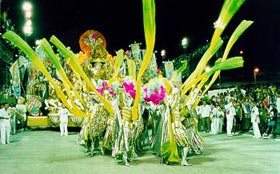Brasil Carnaval
facts of Brasil Carnaval
Brazil Carnaval is a major annual celebration that is held forty days before Easter and mark the start of Lent.
Carnival Rio de Janeiro

If you are planning to Brazil travel northeast during carnaval,
then you will need to familiarise yourself with some of the Brazilian customs and traditions, and other interesting facts about carnival in Brazil. Here are 10 facts about Brazil that you might find interesting:
Naturally, in a country where Brazilians and tourists alike get down to some very serious partying on a grander and much
longer scale than in most Caribbean countries, you should expect some disruptions to businesses, shop opening times etc., It doesn't
matter where you are in Brazil, every where will experience Carnival fever.
For a couple of weeks prior to Brasil carnaval, there are a many carnival balls, which are very popular. As a result, very many shops and some services will be closed. The same can also be said of the few days post carnaval, where it can appear as if the whole of Brazil is nursing a national hangover.
During Carnaval itself, some stores open briefly for a few mornings, but banks and offices will remain closed. Domestic airlines and local and inter-city buses may run a Sunday service during carnaval
The most familiar, famous and most spectacular brasil carnaval is Rio, which is dominated by samba and the parade of samba schools which fiercely compete against each other. They make their way down an enormous concrete expanse called the Sambódromo. The event is so huge, it is televised live to the whole country
Although the Rio Brazil carnival is the most famous and well-known worldwide for the elaborate parades staged by the city’s major samba schools, carnivals in Olinda and Salvador have also become very famous in their own right. They are far more participatory than the Rio Brazil carnaval where spectators are crammed into grandstands, rather than being able
to join in with the Samba school parades
The Portuguese traditions of entrudo throwing water flour and mud at unsuspecting passers-by evolved into a more lighthearted flour and water or egg tossing spree in Brazil. Although the this jovial prank was initially carried out within
the home by the upper classes, the poorer classes took it to the streets. Over time, the elite themselves ventured out onto
the streets to jon in the fuj, - albeit heavily disguised by masks Brasil carnaval in states such as Salvador and other northeast cities, have electronic bands that entertain millions of Brazilians and tourists alike, along street processions -
which take on a real party atmosphere
To really get a feel for the extent of work and effort that goes into the Brasil carnaval preparations, watch Orfeu Negro - Black Orchid; a movie that not only helped to
bring the bossa nova - the merging of Jazz and Samba,
to the attention of the world but also depict the intensity of
the brazil carnival in Rio
Samba comes from Brazil's West African heritage and is the lifeblood of brasil carnivals. Samba is associated with
pounding drums, infectious rhythms, not to mention, a
contagious beat that get even the most reserved going. If you want to experience the true magic of brasil carnivals, then
be sure to Brazil travel northeast, where you can join in and
dance away with the procession
Brazil is predominantly a Catholic country and although Carnavale is linked to the religious practices of Christians and Catholics: - abstaining from meat, Brazilian carnival is in no way representative of a religious festival.
That usually comes after carnaval!
Brasil Carnivals in Bahia and Pernambuco States
Brasil carnivals - carnavals across Brasil take on differt flavours and influences. For a unique carnival experience on your Brazil travel northeast, head for Salvador in Bahia and Recife in Pernambuco
for an experience you will never forget
History Of Carnival
History Of Carnival in Brazil is as dramatic as it is full of intrigue. Rooted in religious influences from Europe, carnival in Brazil today couldn't be further away from its beginnings as
an event reserved for Rio's elite
Samba Dance Brazil - Its History And The Formation Of Samba Schools
Samba dance Brazil is of West African heritage and has become a major element in the success and history of carnival in Brazil today.
feel the infectious rhythm and beat when you Brazil travel northeast
Carnival In Brazil
Carnival in Brazil is known as the festival of festivals. Rich in vibrant music, exotic costumes, dancing, drinking, the Brazil Carnaval is the world's largest celebration. Here are some precautions
you must observe...
Return From Brasil Carnaval To Brazil Travel Northeast Home Page
|






